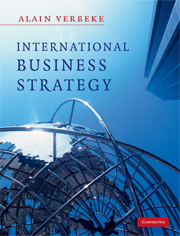Book contents
- Frontmatter
- Contents
- List of figures
- List of case studies
- About the author
- Foreword
- Acknowledgements
- List of abbreviations
- Walkthrough
- Introduction and overview of the book's framework
- Part I Core concepts
- Part II Functional issues
- 6 International innovation
- 7 International sourcing and production
- 8 International finance
- 9 International marketing
- 10 Managing managers in the multinational enterprise
- Part III Dynamics of global strategy
- Conclusion. The true foundations of global corporate success
- Appendix: Suggested additional readings
- Index
7 - International sourcing and production
from Part II - Functional issues
- Frontmatter
- Contents
- List of figures
- List of case studies
- About the author
- Foreword
- Acknowledgements
- List of abbreviations
- Walkthrough
- Introduction and overview of the book's framework
- Part I Core concepts
- Part II Functional issues
- 6 International innovation
- 7 International sourcing and production
- 8 International finance
- 9 International marketing
- 10 Managing managers in the multinational enterprise
- Part III Dynamics of global strategy
- Conclusion. The true foundations of global corporate success
- Appendix: Suggested additional readings
- Index
Summary
This chapter examines Kasra Ferdows' idea that senior MNE managers should try to upgrade their host country factories to give them the ability to develop FSAs. For Ferdows, a factory's ability to develop FSAs is at least as important as low costs. In general, he argues, this will require that senior managers invest in each factory for the long term, and not move production based on changes in exchange rates, costs or government incentives. These ideas will be examined and then criticized using the framework presented in Chapter 1.
Significance
In an HBR piece entitled ‘Making the most of foreign factories’, Kasra Ferdows provides a detailed argument in support of the market seeking and strategic resource seeking arguments for FDI in the context of international manufacturing.
Chapter 5 has already described how MNEs can tap their foreign subsidiaries as sources of competitive advantage, selectively giving certain subsidiaries increased control and decision-making power. Chapter 6 then extended this analysis, with a focus on foreign R&D centres. These centres can develop new knowledge that exploits or even augments the knowledge developed in the home country. This chapter will extend this analysis further, looking at how MNEs can tap their foreign factories.
- Type
- Chapter
- Information
- International Business StrategyRethinking the Foundations of Global Corporate Success, pp. 199 - 218Publisher: Cambridge University PressPrint publication year: 2009

